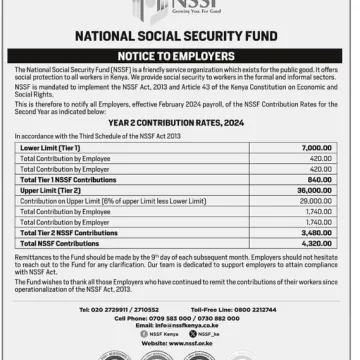Atwoli supports NSSF’s fresh raid on workers' salaries

COTU Secretary-General Francis Atwoli.
The Central Organisation of Trade Unions (COTU) has thrown its weight behind the implementation of higher salary deductions for workers to the National Social Security Fund (NSSF), set to take effect this month, arguing that the plan will benefit workers.
COTU Secretary-General Francis Atwoli noted that the deductions are not only necessary, but also crucial for ensuring workers' financial security in retirement despite public uproar over the oncoming raid on salaries.
"As the voice of Kenyan workers, we affirm that the full implementation of this Act is essential for securing workers' financial futures," he stated.
“As COTU (K), we hold the view that if anyone genuinely cares about workers, they should fully support NSSF in its mission to eliminate old-age poverty by ensuring that every Kenyan saves for retirement. A well-structured pension system provides both a lump sum payout and a monthly pension, enabling retirees to maintain a decent standard of living,” Atwoli explained.
The new NSSF rates will see both employer and employee contributions increase, resulting in reduced take-home pay for salaried Kenyans who already feel overstretched with the existing pay-cuts.
Atwoli explained that NSSF is not a tax but a structured, mandatory savings scheme designed to help workers retire with dignity.
“First and foremost, it is critical to clarify that NSSF is not a tax… Unfortunately, most of those politicizing NSSF enjoy a superior pension or are assured of income streams through the numerous business ventures that they own,” Atwoli noted.
The COTU boss added that social security is a fundamental human right meant to protect individuals from uncertainties such as old-age poverty.
"Any attempts to misrepresent or politicize the revised NSSF rates legally enacted in 2013 only serve to mislead the public, hinder compliance, and jeopardize workers' long-term financial security."
He cited International Labour Organization (ILO) Convention No. 102 (1952), which sets global minimum standards for social security, and Kenya’s Constitution (2010), which explicitly guarantees every citizen the right to pension and social security under Article 43.
Atwoli highlighted that a well-structured pension system provides both a lump sum payout and a monthly pension, allowing retirees to maintain a decent standard of living.
"The ILO recommends that retirees receive at least 40-60 percent of their pre-retirement income, underscoring the need to strengthen NSSF as a mandatory savings scheme," he added.
Atwoli further noted that Kenya is lagging behind in position when compared to her East African counterparts in social security contributions.
“While the NSSF rates in Kenya are set at 12 percent (6 percent from the employer and 6 percent from the employee), Uganda mandates 15 percent (10 percent employer, 5 percent employee), and Tanzania has a much higher contribution rate of 20 percent (10 percent employer, 10 percent employee),” he said.
COTU urged Kenyan workers to disregard anyone opposing the full implementation of the NSSF Act (2013), warning that such opposition threatens their retirement security.
"Kenyan workers must recognize that true allies are those advocating for a better future, particularly their social protection after retirement," COTU stated.





